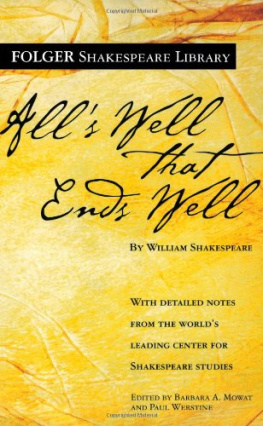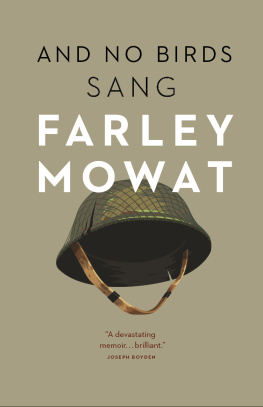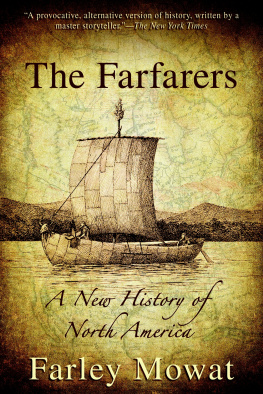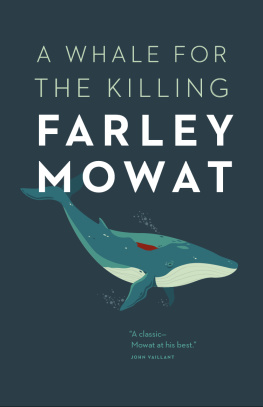Mowat Dr. Barbara A. - Alls Well That Ends Well
Here you can read online Mowat Dr. Barbara A. - Alls Well That Ends Well full text of the book (entire story) in english for free. Download pdf and epub, get meaning, cover and reviews about this ebook. City: Riverside, year: 2006, publisher: Simon & Schuster, genre: Children. Description of the work, (preface) as well as reviews are available. Best literature library LitArk.com created for fans of good reading and offers a wide selection of genres:
Romance novel
Science fiction
Adventure
Detective
Science
History
Home and family
Prose
Art
Politics
Computer
Non-fiction
Religion
Business
Children
Humor
Choose a favorite category and find really read worthwhile books. Enjoy immersion in the world of imagination, feel the emotions of the characters or learn something new for yourself, make an fascinating discovery.

- Book:Alls Well That Ends Well
- Author:
- Publisher:Simon & Schuster
- Genre:
- Year:2006
- City:Riverside
- Rating:4 / 5
- Favourites:Add to favourites
- Your mark:
- 80
- 1
- 2
- 3
- 4
- 5
Alls Well That Ends Well: summary, description and annotation
We offer to read an annotation, description, summary or preface (depends on what the author of the book "Alls Well That Ends Well" wrote himself). If you haven't found the necessary information about the book — write in the comments, we will try to find it.
Alls Well That Ends Well — read online for free the complete book (whole text) full work
Below is the text of the book, divided by pages. System saving the place of the last page read, allows you to conveniently read the book "Alls Well That Ends Well" online for free, without having to search again every time where you left off. Put a bookmark, and you can go to the page where you finished reading at any time.
Font size:
Interval:
Bookmark:
This eBook contains special symbols that are important for reading and understanding the text. In order to view them correctly, please activate your devices Publisher Font or Original font setting; use of optional fonts on your device may result in missing, or incorrect, special symbols.
Also, please keep in mind that Shakespeare wrote his plays and poems over four hundred years ago, during a time when the English language was in many ways different than it is today. Because the built-in dictionary on many devices is designed for modern English, be advised that the definitions it provides may not apply to the words as Shakespeare uses them. Whenever available, always check the glosses linked to the text for a proper definition before consulting the built-in dictionary.
Thank you for downloading this Washington Square Press eBook.
Join our mailing list and get updates on new releases, deals, bonus content and other great books from Washington Square Press and Simon & Schuster.
C LICK H ERE T O S IGN U P
or visit us online to sign up at
eBookNews.SimonandSchuster.com
We hope you enjoyed reading this Washington Square Press eBook.
Join our mailing list and get updates on new releases, deals, bonus content and other great books from Washington Square Press and Simon & Schuster.
C LICK H ERE T O S IGN U P
or visit us online to sign up at
eBookNews.SimonandSchuster.com
THE NEW FOLGER LIBRARY
SHAKESPEARE
Designed to make Shakespeares great plays available to all readers, the New Folger Library edition of Shakespeares plays provides accurate texts in modern spelling and punctuation, as well as scene-by-scene action summaries, full explanatory notes, many pictures clarifying Shakespeares language, and notes recording all significant departures from the early printed versions. Each play is prefaced by a brief introduction, by a guide to reading Shakespeares language, and by accounts of his life and theater. Each play is followed by an annotated list of further readings and by a Modern Perspective written by an expert on that particular play.
Barbara A. Mowat is Director of Research emerita at the Folger Shakespeare Library, Consulting Editor of Shakespeare Quarterly , and author of The Dramaturgy of Shakespeares Romances and of essays on Shakespeares plays and their editing.
Paul Werstine is Professor of English at the Graduate School and at Kings University College at Western University. He is a general editor of the New Variorum Shakespeare and author of Early Modern Playhouse Manuscripts and the Editing of Shakespeare and of many papers and articles on the printing and editing of Shakespeares plays.
The Folger Shakespeare Library in Washington, D.C., is a privately funded research library dedicated to Shakespeare and the civilization of early modern Europe. It was founded in 1932 by Henry Clay and Emily Jordan Folger, and incorporated as part of Amherst College in Amherst, Massachusetts, one of the nations oldest liberal arts colleges, from which Henry Folger had graduated in 1879. In addition to its role as the worlds preeminent Shakespeare collection and its emergence as a leading center for Renaissance studies, the Folger Shakespeare Library offers a wide array of cultural and educational programs and services for the general public.
EDITORS
BARBARA A. MOWAT
Director of Research emerita
Folger Shakespeare Library
PAUL WERSTINE
Professor of English
Kings University College at Western University, Canada


Washington Square Press
1230 Avenue of the Americas
New York, NY 10020
www.SimonandSchuster.com
Copyright 2001 by The Folger Shakespeare Library
All rights reserved, including the right to reproduce this book or portions thereof in any form whatsoever. For information address Washington Square Press, 1230 Avenue of the Americas, New York, NY 10020
ISBN-13: 978-0-7434-8497-8
ISBN-10: 0-7434-8497-5
ISBN-13: 978-1-5011-3685-6 (eBook)
Washington Square Press New Folger Edition June 2001, January 2006; this eBook edition March 2016
WASHINGTON SQUARE PRESS and colophon are registered trademarks of Simon & Schuster, Inc.
For information regarding special discounts for bulk purchases, please contact Simon & Schuster Special Sales at 1-800-456-6798 or .
It is hard to imagine a world without Shakespeare. Since their composition more than four hundred years ago, Shakespeares plays and poems have traveled the globe, inviting those who see and read his works to make them their own.
Readers of the New Folger Editions are part of this ongoing process of taking up Shakespeare, finding our own thoughts and feelings in language that strikes us as old or unusual and, for that very reason, new. We still struggle to keep up with a writer who could think a mile a minute, whose words paint pictures that shift like clouds. These expertly edited texts are presented as a resource for study, artistic exploration, and enjoyment. As a new generation of readers engages Shakespeare in eBook form, they will encounter the classic texts of the New Folger Editions, with trusted notes and up-to-date critical essays available at their fingertips. Now readers can enjoy expertly edited, modern editions of Shakespeare anywhere they bring their e-reading devices, allowing readers not simply to keep up, but to engage deeply with a writer whose works invite us to think, and think again.
The New Folger Editions of Shakespeares plays, which are the basis for the texts realized here in digital form, are special because of their origin. The Folger Shakespeare Library in Washington, D.C., is the single greatest documentary source of Shakespeares works. An unparalleled collection of early modern books, manuscripts, and artwork connected to Shakespeare, the Folgers holdings have been consulted extensively in the preparation of these texts. The Editions also reflect the expertise gained through the regular performance of Shakespeares works in the Folgers Elizabethan Theater.
I want to express my deep thanks to editors Barbara Mowat and Paul Werstine for creating these indispensable editions of Shakespeares works, which incorporate the best of textual scholarship with a richness of commentary that is both inspired and engaging. Readers who want to know more about Shakespeare and his plays can follow the paths these distinguished scholars have tread by visiting the Folger either in person or online, where a range of physical and digital resources exist to supplement the material in these texts. I commend to you these words, and hope that they inspire.
Michael Witmore
Director, Folger Shakespeare Library
In recent years, ways of dealing with Shakespeares texts and with the interpretation of his plays have been undergoing significant change. This edition, while retaining many of the features that have always made the Folger Shakespeare so attractive to the general reader, at the same time reflects these current ways of thinking about Shakespeare. For example, modern readers, actors, and teachers have become interested in the differences between, on the one hand, the early forms in which Shakespeares plays were first published and, on the other hand, the forms in which editors through the centuries have presented them. In response to this interest, we have based our edition on what we consider the best early printed version of a particular play ( explaining our rationale in a section called An Introduction to This Text ) and have marked our changes in the textunobtrusively, we hope, but in such a way that the curious reader can be aware that a change has been made and can consult the Textual Notes to discover what appeared in the early printed version.
Font size:
Interval:
Bookmark:
Similar books «Alls Well That Ends Well»
Look at similar books to Alls Well That Ends Well. We have selected literature similar in name and meaning in the hope of providing readers with more options to find new, interesting, not yet read works.
Discussion, reviews of the book Alls Well That Ends Well and just readers' own opinions. Leave your comments, write what you think about the work, its meaning or the main characters. Specify what exactly you liked and what you didn't like, and why you think so.



![Farley Mowat - People of the Deer [Paperback]](/uploads/posts/book/52958/thumbs/farley-mowat-people-of-the-deer-paperback.jpg)

